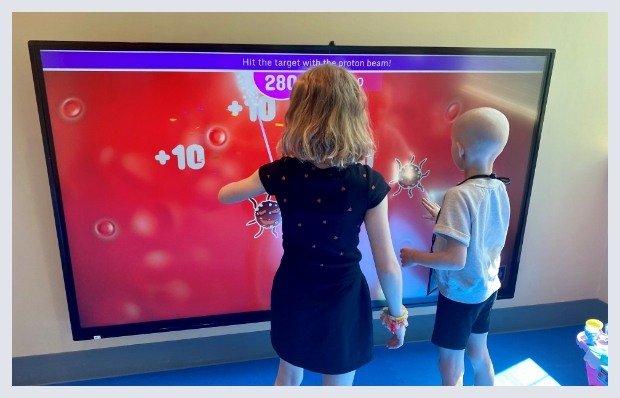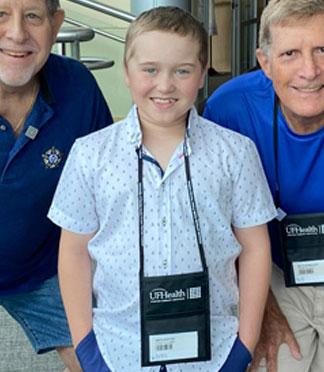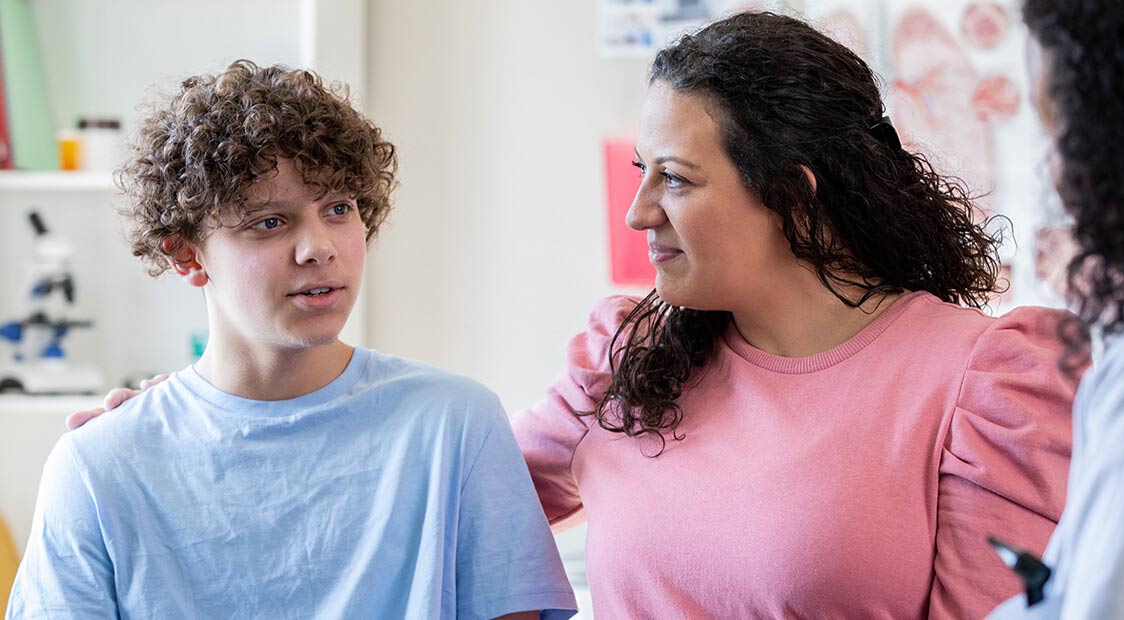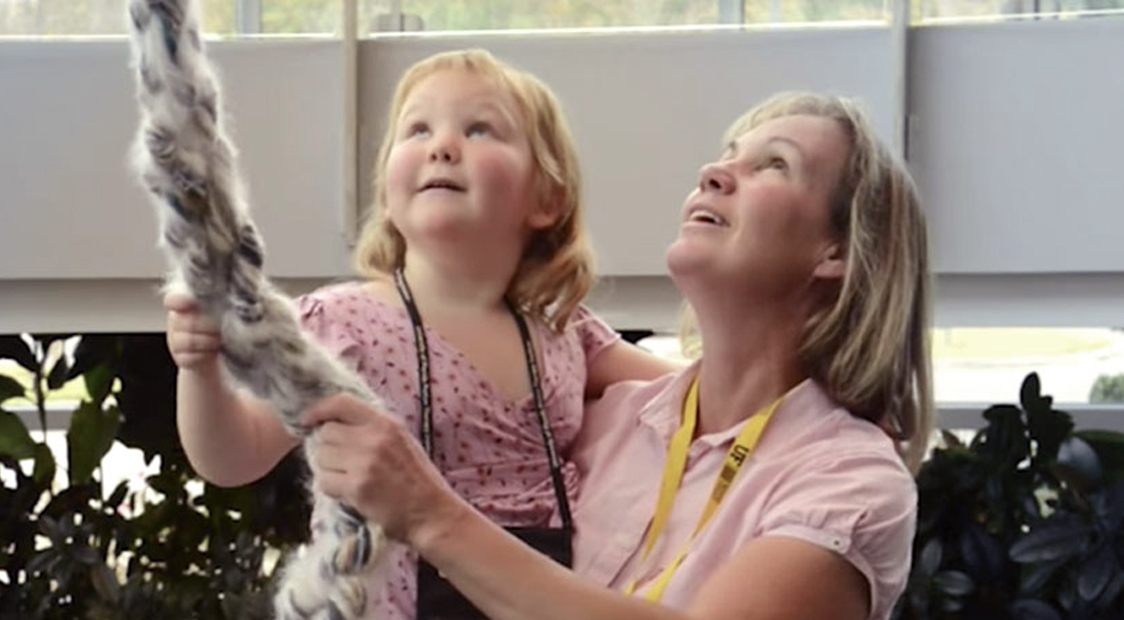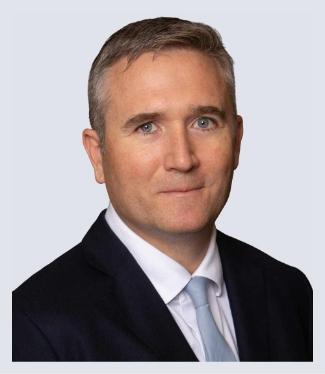For more than a decade, the team at UF Health Proton Therapy Institute has treated more pediatric patients than any other proton center in the world. This means that doctors at the University of Florida have unparalleled experience treating even the rarest tumors of childhood. The pediatric team at the University of Florida has published some of the largest studies of children treated with proton therapy for tumors such as ependymoma1 and low grade glioma.2 This background is critical as recent research suggests that children with brain tumors and sarcomas experience better survival in high volume centers.3,4
In addition to pediatric radiation oncologists, the team at UF Health Proton Therapy Institute is made up of a specialized pediatric anesthesiology team, a team of devoted pediatric radiation oncology nurses, and a dedicated pediatric social worker, each with years of experience working with children undergoing proton therapy. The professional technical staff who operate the proton gantries are skilled and comfortable treating young patients, from infancy through young adulthood. This familiarity is the result of literally thousands of treatment sessions involving young patients.
All children and adolescents treated at UF Health Proton Therapy Institute receive multidisciplinary care, where the focus extends beyond just aspects of radiation. This support is critical for the most complex cases requiring chemotherapy, anesthesia, or specialized surgery. During their time in Jacksonville, children at the UF Health Proton Therapy Institute are concurrently followed by the pediatric subspecialists at Nemours Specialty Clinic and Wolfson Children’s Hospital. Both are consistently named among the nation's best by U.S. News & World Report.
The UF Health pediatric program is built on the recognition that successful pediatric care involves far more than high speed particles and advanced physics. We devote the same energy to the overall well-being of our young patients and their families. That is why we offer the most comprehensive and holistic support network in our field. This programming includes behind-the-scenes pretreatment tours and age-appropriate videos and interactive iPad applications to help children feel more comfortable before their treatment, school advocacy, an adolescent and young adult program, and ongoing psychological assessment and supportive counseling provided by our pediatric social worker. Moreover, we know pediatric tumors and cancer impact the whole family. Ninety percent of our families come from outside Jacksonville and therefore we devote generous attention to ensure that everyone, including parents and siblings, feels supported. Other coordinated special events include group trips to local community events, performances, sporting events, and local attractions.
The University of Florida is a national leader in pediatric cancer research and this extends to the Pediatric Proton Therapy Program. Children treated at the University of Florida have access to international studies through the Children’s Oncology Group (COG). In addition, the UF Health Proton Therapy Institute offers its own innovative protocols designed to advance the field of pediatric radiation oncology through safer, more effective therapy. Over 98% of children treated in 2020 were enrolled on a prospective research protocol.
We are one of the few sites worldwide that offers both pencil beam scanning and double scattered proton therapy options, allowing us to select the optimal treatment for each child. In 2019, the center installed a Proteus One proton unit, expanding our capacity and ensuring our patients have access to the newest technology in North America.
The pediatric proton therapy program plays an important role in one of the fundamental missions of the University of Florida: education. Doctors from Moffitt Cancer Center, Mayo Clinic, and other medical schools rotate through the UF Health pediatric proton therapy service to learn the latest techniques for treating pediatric tumors. In order to meet the impending demand for pediatric proton therapy specialists, the University of Florida developed the nation’s first dedicated pediatric proton therapy fellowship in 2011. Members of the UF Health pediatric proton therapy team delivered over a dozen national and international lectures to radiation oncologists and pediatric oncologists in 2020. This same spirit of education extends to the clinical setting, where doctors and nurses take their time to teach patients of all ages about their diagnosis and treatment options.
1Indelicato DJ, Bradley JA, Rotondo RL, Nanda RH, Logie N, Sandler ES, Aldana PR, Ranalli NJ, Beier AD, Morris CG, Mendenhall NP. Outcomes following proton therapy for pediatric ependymoma. Acta Oncol. 2018 May;57(5):644-648. doi: 10.1080/0284186X.2017.1413248. Epub 2017 Dec 14. PMID 29239262
2Indelicato DJ, Rotondo RL, Uezono H, Sandler ES, Aldana PR, Ranalli NJ, Beier AD, Morris CG, Bradley JA. Outcomes Following Proton Therapy for Pediatric Low-Grade Glioma. Int J Radiat Oncol Biol Phys. 2019 May 1;104(1):149-156. doi: 10.1016/j.ijrobp.2019.01.078. Epub 2019 Jan 23. PMID: 3068466
3Knops RRG, vanDalen EC, Mulder RL, et al. The volume effect in paediatric oncology: A systematic review. Ann Oncol. 2013;24(7):1749-1753.
4Ludmir EB et al. Relationship between Treatment Center Case Volume and Outcomes for Ewing Sarcoma Patients: The Role of Local Therapy Timing. Intl J Radiat Oncol Biol Phys., 2019;105(1)S190.


